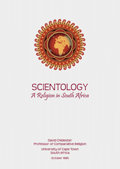Among other things, religions are distinctive human experiments in the production of sacred time and sacred space. Religions mark out the holy days of a sacred calendar for special observance, celebration, or commemoration. Religions also mark out sacred places—places of worship, places of gathering, places of pilgrimage—for a special kind of ritual attention. By participating in sacred time and space, human beings ground their religious commitments in the world.
All religions, even “new religious movements,” find ways to make time and space sacred. In the international sacred calendar of the Church of Scientology, for example, the 11th of November is designated as “National Founding Day, South Africa,” celebrating the establishment of the first Scientology church in South Africa, the church that was founded in Johannesburg in 1957. Although lectures on Scientology had been presented in Johannesburg as early as 1955, the founding of the first church there marked the beginning of Scientology’s organised religious life in South Africa.
After more than a decade of growth, the church encountered opposition from the South African government. Under the auspices of the Department of Health, a formal government Commission of Inquiry was convened between April 1969 and December 1970 to investigate the Church of Scientology. Submitting its report in 1972, the commission issued the insupportable recommendation that Scientology should not be legally recognized as a church or a religion in South Africa.
However, in spite of this commission’s recommendation, the Church of Scientology was allowed to register as a non-profit organisation. In the international sacred calendar of Scientology, the 16th of January marks the holiday “Recognition Day Africa” in commemoration of the day in 1975 on which the Church of Scientology was recognized as a non-profit organisation in South Africa. The church awaits, however, full legal recognition, in keeping with the recognition that Scientology has received elsewhere in the world, as a bona fide religion in South Africa. When that occurs, a new holiday might be added to the international sacred calendar of the Church of Scientology.
In the production of sacred space, the Church of Scientology has established places of worship in most of the major metropolitan centres of the country. Following the lead of the first church in Johannesburg, Scientology churches were founded in Cape Town in 1961, in Port Elizabeth in 1962, in Durban in 1963, and in Pretoria in 1968. Another church was founded in Johannesburg, serving Johannesburg North, in 1981. Like any sacred place, these churches are sites for special kinds of religious activity. Ordained ministers at these churches offer a wide range of religious services, including Sunday sermons, pastoral counselling, and rituals for marriages, christenings, and funerals, that make these sites vital centres of Scientology religious life.
Scientology is an “applied religious philosophy. Its goal is to bring an individual to an understanding of himself and his life as a spiritual being and in relationship to the universe as a whole.” In other words, the Church of Scientology develops a religious way of being human that is realized in relation to sacred and superhuman dimensions of life.
Like any other religion, therefore, Scientology is a distinctive human experiment in the production of sacred time and sacred space. However, also like any other religion, Scientology is a distinctive human experiment in being human. By the church’s own definition, Scientology is an “applied religious philosophy. Its goal is to bring an individual to an understanding of himself and his life as a spiritual being and in relationship to the universe as a whole.”1 In other words, the Church of Scientology develops a religious way of being human that is realized in relation to sacred and superhuman dimensions of life.
Standard academic definitions of religion tend to focus on either the superhuman or sacred features of religious worlds. In an approach to defining religion that can be traced back to the nineteenth-century anthropologist, E. B. Tylor, religion is essentially an engagement with superhuman transcendence. In these terms, religion is a set of beliefs and practices in relation to spiritual, supernatural, or superhuman beings that rise above and go beyond the ordinary level of human existence. In another approach to defining religion, which can be traced back to the work of the Sociologist Emile Durkheim, religion is a set of beliefs and practices related to a sacred focus that unifies a human community. From this perspective, religion invests life with sacred meaning and power through beliefs in myths and doctrines, through the practices of ritual and ethics, through personal experience, and through forms of social organisation.2
Certainly, the Church of Scientology, which grew out of the spiritual healing techniques of Dianetics that had been formulated by 1950 by its founder, L. Ron Hubbard, can be defined as a religion in terms of the standard definitions. However, academic discussions tend to ignore the political dynamics of denial and recognition that are involved in defining religion. Before outlining the basic features of the religion of Scientology, therefore, it will be necessary to reflect briefly here on the contested history of recognizing religion in South Africa.





























